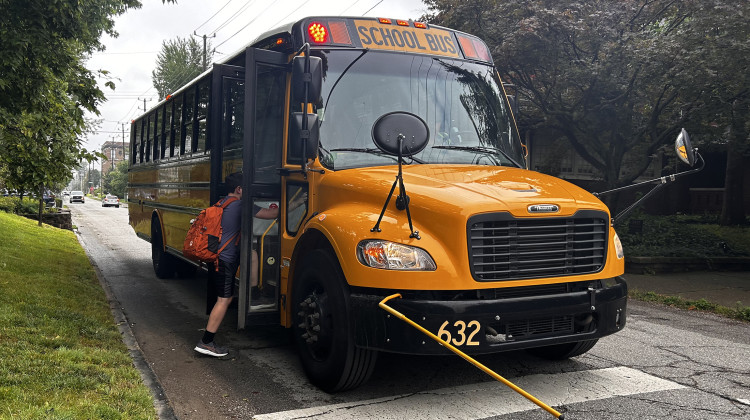
The proposal would eliminate most state diplomas, such as the Core 40, and replace them with new graduation requirements.
Brett Jordan / UnsplashIndiana’s Department of Education seeks to overhaul how students earn high school diplomas after a yearslong push from state lawmakers to create more work-based learning options.
The State Board of Education gave the department approval Wednesday to move forward with its high school redesign by getting public feedback. The plan will go through several revisions before it is finalized.
The proposal would eliminate most state diplomas, such as the Core 40, and replace them with new graduation requirements.
Secretary of Education Katie Jenner described the proposal as the most significant update to diplomas in around 40 years. The plan is intended to upend the traditional approach, Jenner said, by encouraging students to pursue work-based learning and earn credentials while in high school.
“The reality is, the structure of the American high school experience has not changed for most students in over one-hundred years,” Jenner said in a statement. “We have an incredible opportunity to help every student find their purpose, know their value and understand the possibilities for their life’s path.”
The department aims to bring a revised draft to the state board by September. Under state law, the board is required to adopt a plan by December.
The new diploma requirements will take effect statewide with the class of 2029. But local districts will be able to opt-in early, Jenner said.
Reinventing high school
The overhaul is driven by state lawmakers. During the 2023 legislative session, Republican leaders sought to establish a vision to “reinvent” traditional high school curriculum with an emphasis on more work-based learning options. Legislation called for the redesign of high school diplomas and created Career Scholarship Accounts for career training for high schoolers.
Jenner said she expects there to be more interest in those accounts under new graduation requirements.
“They were started to remove barriers for students who may want to do a work-based learning experience but don't have transportation, or they may want to earn that credential of value from the local college but they don’t have the dual credit course in their high school.”
State Board member Scott Bess said he believes other education leaders in the country are watching Indiana to see how this shift works.
“This isn’t perfect by any stretch but we have to start somewhere,” Bess said.
The state’s new diplomas
Under the department’s plan the state would stop offering most existing diplomas — such as the Core 40, honors and technical — with the Class of 2028. Alternate diplomas for students with cognitive disabilities would continue.
While core course requirements would remain mostly in place, there would be some changes to what students take throughout their high school years.
The proposal allows students to choose between two diploma types: The Indiana GPS Diploma and Indiana GPS Diploma Plus.
For students to earn a GPS Diploma they must take foundational subjects like English, math, science and civics. In addition to core classes, students in 11th and 12th grade could take courses like dual credit and work-based learning.
The model would also give students school credit for non-academic work. A student who is looking to satisfy work ethic requirements, for example, could fulfill it by taking a physical education or health class. But they could also earn those credits by participating in an extracurricular for two seasons or having a job.
Jenner said the base GPS Diploma allows juniors and seniors to personalize their route of study depending on their graduation plan.
The GPS Diploma Plus includes those same requirements. But students must also complete a work-based learning experience, like an internship, and earn a credential beyond their high school diploma, like an industry certification or the Indiana College Core.
Bess said that it would be difficult to rely on part-time jobs or attending job fairs to fulfill degree requirements because schools will need to verify whether students participate.
“If you’ve got 1,200 seniors and you’ve got to get verifications, I hope that we don’t go back to our counselors and say ‘hey, make sure that you follow-up with every student to make sure they did that’ because now you just doubled their work,” Bess said.
The strength of these new diplomas will be that everything students do — even outside the classroom — counts, Bess said.
Rachel Fradette is the WFYI Statehouse education reporter. Contact Rachel at rfradette@wfyi.org.
 DONATE
DONATE






 Support WFYI. We can't do it without you.
Support WFYI. We can't do it without you.